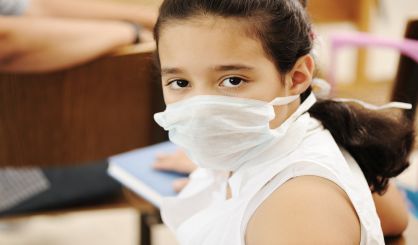
As COVID-19 cases and hospitalizations continue to decline in the state, the Michigan Department of Health and Human Services (MDHHS) is updating its mask guidance for public settings, including school settings, to reflect that Michigan is entering a post-surge, recovery phase.
Moving forward, the COVID-19 cycle can be broken down into three key phases:
- Response – Local and state public health implement rapid response to a surge.The public may be advised to increase masking, testing and social distancing.
- Recovery – Post-surge. No immediate resurgence predicted. Local and state public health will monitor conditions that could lead to future surges.
- Readiness – A surge in cases is expected, with implications on severity of illness and hospital capacity. Increased communication to the public regarding possible new risks.
Currently, decreases in cases and hospitalizations and increased access to vaccines, testing and treatment indicate that Michigan is entering a post-surge, recovery phase of the cycle.
During this phase, MDHHS recommends that all individuals, regardless of vaccination status, continue to practice universal masking in high-risk congregate settings including long-term care facilities, homeless shelters, correctional facilities, jails and health care facilities. All individuals, regardless of vaccination status, should also wear a mask during isolation and quarantine periods to stop further community spread of COVID-19.
School districts and organizations should consider local conditions and work with their local health department to determine mask policies for school districts, public meetings and large events. Masks are an important tool in mitigating spread of COVID-19 and individuals who may be at higher risk of infection or who feel better protected when masked should choose when they feel comfortable masking.
“This is good news for Michigan,” said Gov. Gretchen Whitmer. “While Michigan hasn’t had statewide mask policies since last June, this updated guidance will underscore that we are getting back to normal. Let’s keep working together to build on our momentum so we can keep our kids learning in person.”
“Individuals and families should assess their own risk for COVID-19 exposure and transmission and make choices about when it makes sense to wear masks,” said Elizabeth Hertel, MDHHS director. “We want to make sure individuals and local communities have the information and tools they need to make choices for their families based on their personal situation and local community conditions. We continue to strongly urge all residents ages 5 and older get the safe and effective COVID-19 vaccine and to get boosted when eligible as the vaccine continues to be our best defense against the virus.”
Today’s announcement follows Governor Whitmer’s signing of the bipartisan $1.2 billion supplemental funding bill, which includes $150.8 million for testing and screenings in schools so kids can continue safely learning in-person.
Michiganders should consider their individual and family members’ risk factors and vaccination status when making the personal decision whether to mask. Those with chronic illnesses or who are immunocompromised are at higher risk for poor outcomes from COVID-19 and would benefit most from masking in indoor settings. These risk factors may include age, medical conditions and vaccination status.
MDHHS will continue to monitor the transmission of COVID-19 closely to assess risk across the state and adjust as conditions change. These changes could include the presence of a new variant that increases the risk to the public, or an increased number of cases that strains the health care system.
“For the past several months, we have been in a response phase as COVID-19 cases and hospitalizations surged,” said Dr. Natasha Bagdasarian, MDHHS chief medical executive. “With the continued decline in cases and hospitalizations, we are now entering a post-surge, recovery phase. As we move through the phases of our COVID-19 response our recommendations will be updated to reflect the current status of transmission, but we will continue to prioritize public health and promote health and wellness for all families and communities.”
MDHHS continues to recommend the use of layered mitigation strategies for Michiganders:
- Get vaccinated against COVID-19.Michiganders should get up to date on their COVID-19 vaccine. Learn more about vaccines and when you’re up to date at gov/COVIDVaccine.
- After testing positive for COVID-19, individuals are encouraged to talk to their doctors about whether they meet eligibility criteria and should get antibody or antiviral treatment to help with their recovery. Learn more about COVID-19 Therapeutics.
- Isolation and Quarantine.Staying away from others when you are sick or were recently exposed to COVID-19 are important tools to preventing further spread of the virus. Learn more about what happens when you have or are exposed to COVID-19
- Get tested if you are exposed or have symptoms.Anyone with signs or symptoms of COVID-19 should get tested regardless of vaccination status or prior infection. If you get tested because you have symptoms or were potentially exposed to the virus, you should stay away from others while you wait for your test result. Testing before unmasked gatherings provides an additional layer of protection. Find a test site at gov/CoronavirusTest.
- Take additional steps to protect yourself and others. For additional guidance on mitigation strategies see How to Protect Yourself and Others.
- Get a free mask. Free KN95 masks are being distributed by community organizations, including local MDHHS offices, health departments and Area Agency on Aging offices. Residents who want masks can obtain masks from partner agencies across the state. Michiganders are asked to refer to partner websites or social media sites to find out about mask availability as opposed to calling sites.






